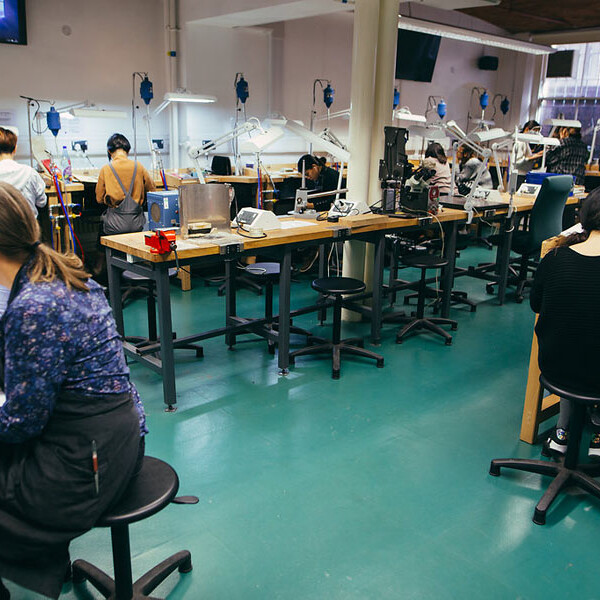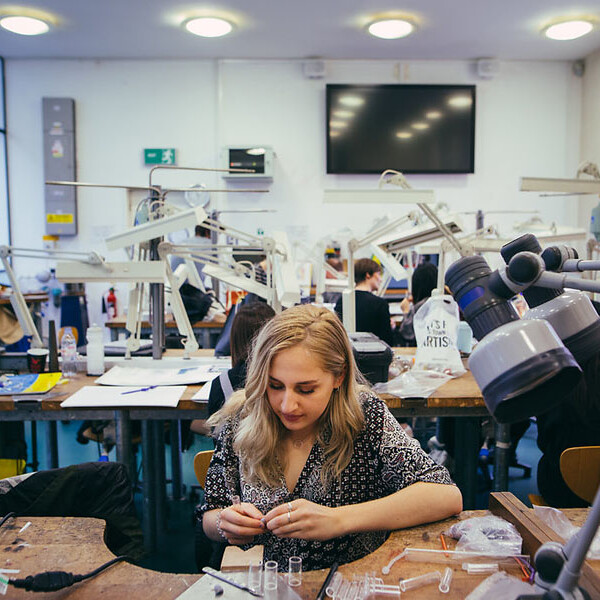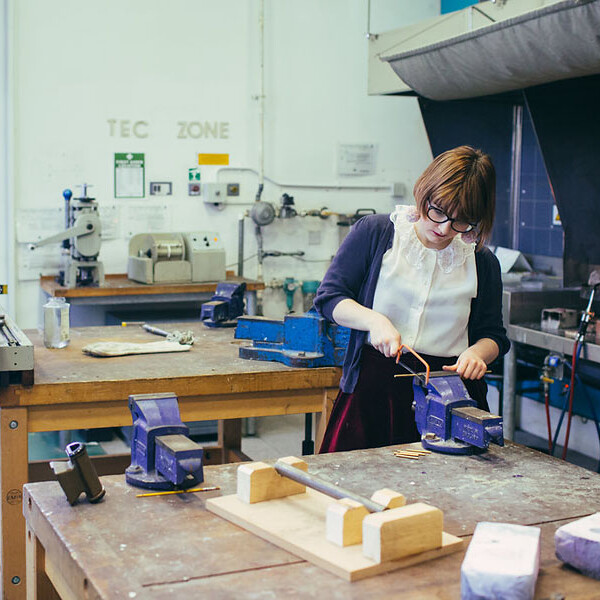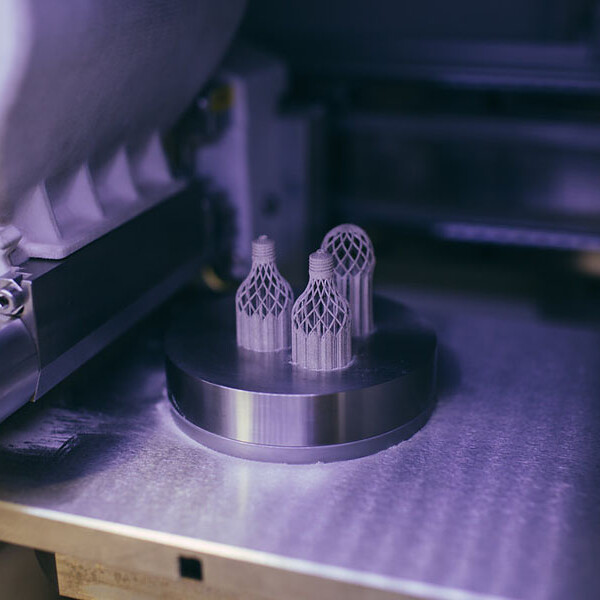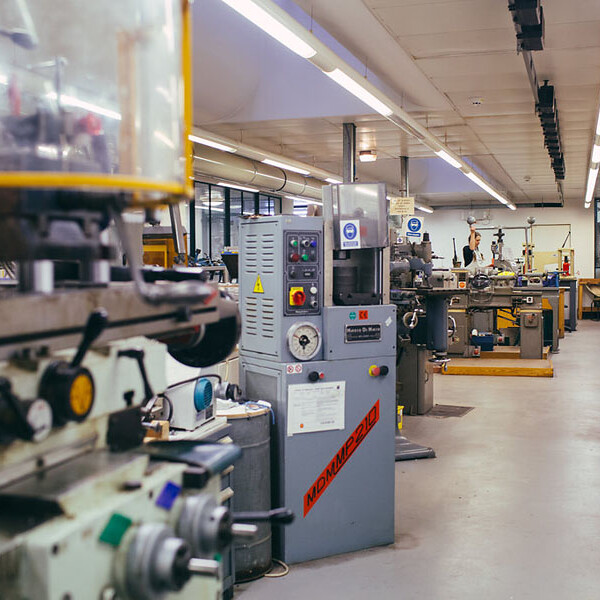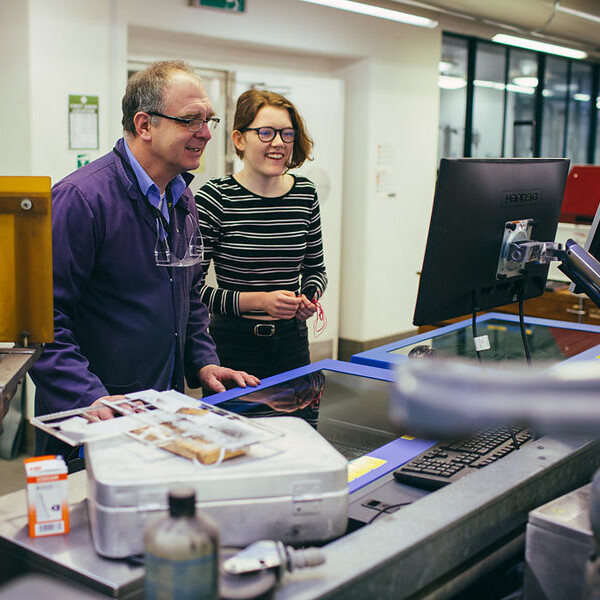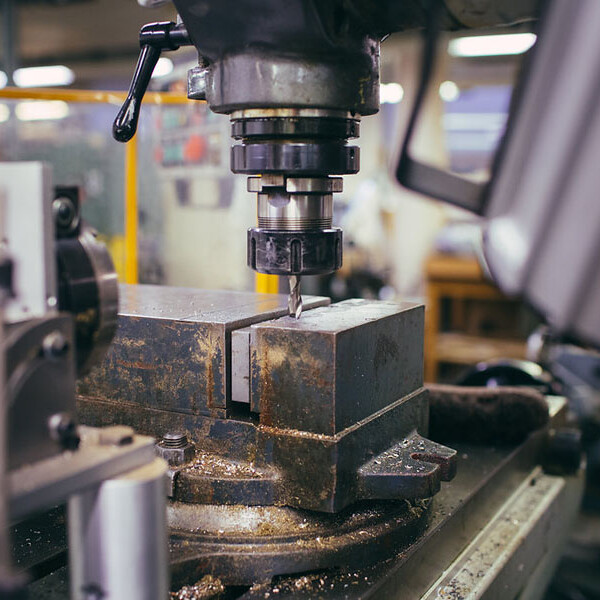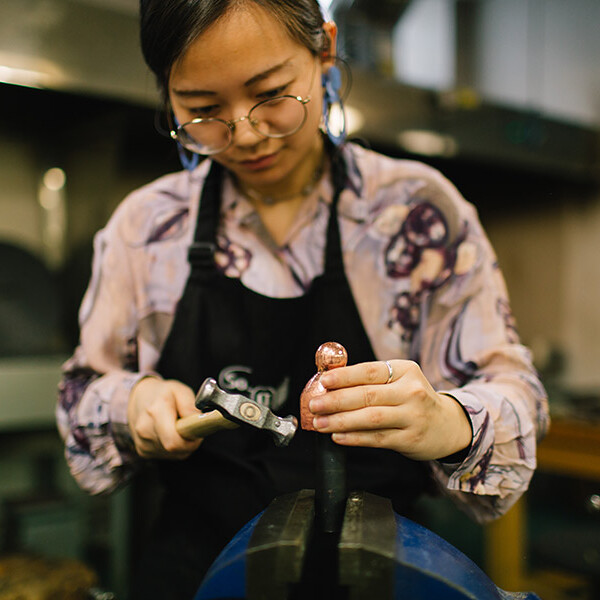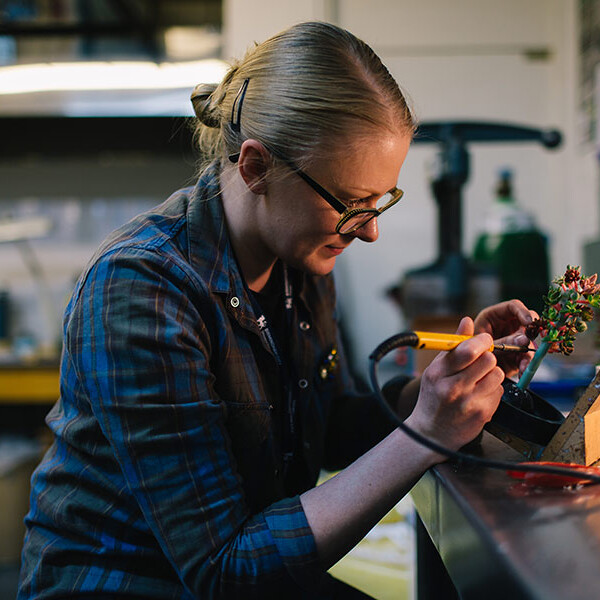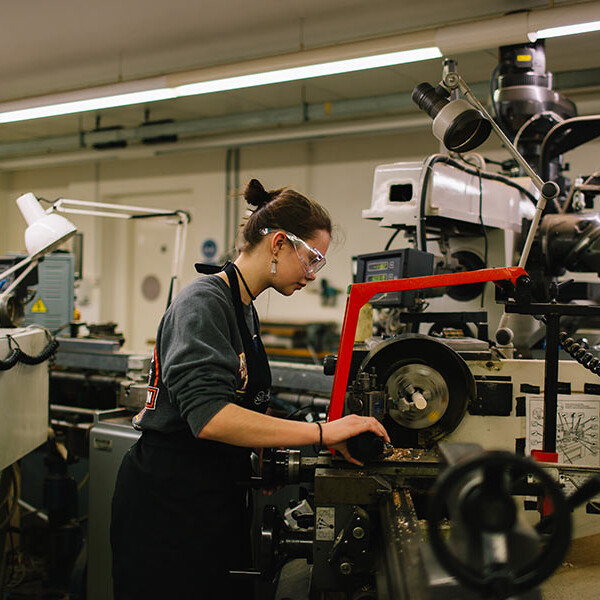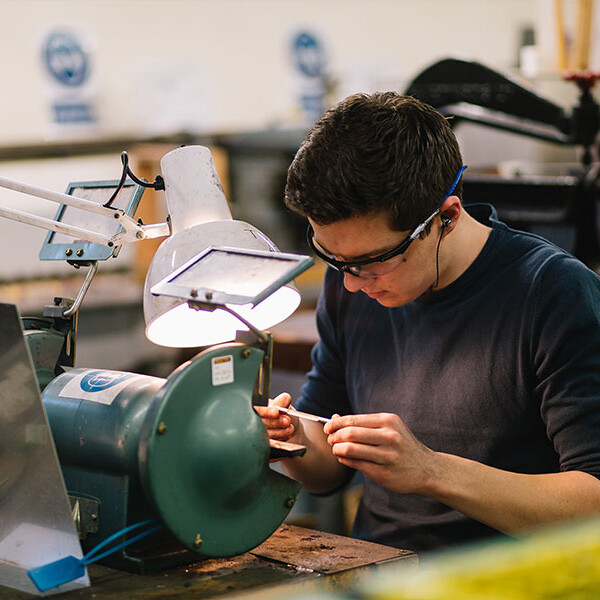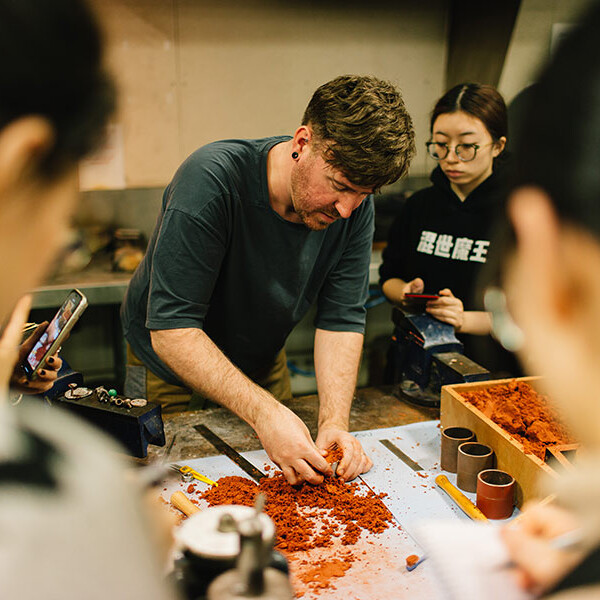
Horology with a Foundation Year - BA (Hons)
Currently viewing course to start in 2025/26 Entry.
This four year undergraduate course has been specifically created to allow students who do not initially meet the entry requirements for a three year degree, to undertake additional level 3 study designed to ensure they are successful on their chosen degree....
- Level Foundation
- Study mode Full Time
- Award BA (Hons)
- Start date September 2025
- Fees View course fees
- Subject
- Location School of Jewellery
This course is:
Open to International Students
Overview
00:00:02:17 - 00:00:27:22
Speaker 1
My name is Lincoln Hamilton. I'm from Watford and I work at Bonhams Auctioneers. So horology is the science of clocks, watches and timekeepers, and it goes through everything from the theoretical end of the spectrum. So how do you account for gravity? Which shape counts for gravity, best for pellets, wheels, etc. all the way down to, here's some metal,
00:00:28:05 - 00:00:53:07
Speaker 1
go make a clock or a watch or a timekeeper. My role is clock cataloguer every day I have people contacting me about clocks in their possession and it's over. A relation of theirs has passed on and they want to get their clocks valued or they bought them in. Antique shop clocks are still very much a part of people's lives clocks, automata, timepieces.
00:00:54:00 - 00:01:23:21
Speaker 1
They've really kind of been alongside humanity throughout history. I mean, even going as far back, you would have buckets sinking in a bigger bucket to keep track of time. You would have incense or candles throughout humanity. Timekeeping has been very important. So I was really interested in physiology from quite a young age, but I would take apart, you know, old stereos working and try and put them back together and find out what made them work.
00:01:24:10 - 00:01:47:19
Speaker 1
And I always quite like that. And then when I was older, I found out that horology is still very much alive and is also a career. I was overjoyed when I found out that it was still going strong and Birmingham's City's Horology Program is the only degree level Horology program in the world. So it made sense to apply really.
This four year undergraduate course has been specifically created to allow students who do not initially meet the entry requirements for a three year degree, to undertake additional level 3 study designed to ensure they are successful on their chosen degree.
After successful completion of your foundation year, you will have the opportunity to switch (should you wish to change direction) onto a number of related undergraduate degree programmes.
Discover new designs and materials, discuss the theory behind clocks and watches, and develop specialist skills with our Horology degree, the only course of its type.
You will enhance your skills of servicing and restoration to industry standard, as well as using Computer Aided Design (CAD) and rapid prototyping to explore different methods and designs.
What's covered in this course?
The Foundation year of your course will introduce you to the breadth of, and the possibilities within, the industries of Jewellery, Gemmology and Horology. You will gain an understanding of some of the key principals and relevant technical terminology, and have the opportunity to develop and apply some of the basic skills whilst gaining an overview of the key industry resources.
Alongside exploring the industry specific qualities, techniques and process you will gain an understanding of the requirements and methodology for further study at HE level. You will develop enhanced directed and independent learning techniques, focusing on your critical and reflective skills.
Our unique undergraduate Horology course will enable you to study clocks and watches, both mechanical and electronic, as well as assessing the art and science of time measurement.
Combining traditional craftsmanship with the latest technology, this course looks at the theory of horology, as well as providing you with valuable practical skills. You’ll examine the history of timekeeping, how clocks and watches work, and how they are designed, providing you with the restoration skills that are in demand within the industry.
The course uses industry-standard software, such as the Solidworks CAD package, to teach design and technical drawing skills, as well as both traditional and modern niche skills of repair, conservation and restoration. Our workshops give you access to timing and testing equipment, as well as machine tools, including advanced five-axis milling and engine turning equipment.
Our reputation and staff connections mean that our professional links are outstanding. We have unique industry partnerships with luxury goods brands, such as Cartier Richemont (UK), who own the brands IWC, Panerai, Piaget, Jaeger-LeCoultre, Baume et Mercier and Montblanc.
We also boast a partnership with Louis Vuitton Moet Hennessy (LVMH), and have recently joined forces with established UK brand Christopher Ward. All these offer work placements, one-to-one mentoring and the chance to develop technical skills in a commercial environment.
You’ll study at our internationally-renowned School of Jewellery, in the heart of Birmingham’s famous working Jewellery Quarter. Our Vittoria Street building mixes the modern with the classical, and includes workshops, a specialist library, an atrium gallery and exhibition space.
This course teaches a plethora of skills which will make what I do next just that bit more comfortable. Coming to study Horology with a Foundation Year gave me that extra needed time to properly get comfortable with the University, city and staff.
Aleemah Ullah, student
Why Choose Us?
- Our outstanding industry links include Swatch, Rolex, Christopher Ward, Time In Hand, Richard Higgins Conservation and the British Museum.
- You will be supported by experienced staff and visiting tutors, who inspire through example and share their expertise in practice, research and design techniques.
- We boast unique partnerships with luxury goods brands LVMH and CartierUK, part of the Richemont group, and give you the chance to undertake placements, mentoring and develop technical expertise in a commercial setting.
- You will have the opportunity to gain the professional accreditation of the British Horological Institute.
- We have a strong employability record, with the majority of our students getting offers of work, often within days of graduating.
- All of our Horology degree students receive a tool/materials bursary from the George Daniels Educational Trust worth up to £1,400, along with opportunities to qualify for further financial support.
Open Days
Join us for an Open Day where you'll be able to learn about this course in detail, chat to students, explore our campus and tour accommodation. Booking isn't open for this event yet, register your interest and we'll let you know as soon as booking goes live.
Next Open Day: 28 June 2025
Entry Requirements
These entry requirements apply for entry in 2025/26.
All required qualifications/grades must have been achieved and evidenced at the earliest opportunity after accepting an offer to help confirm admission and allow for on-time enrolment. This can also include other requirements, like a fee status form and relevant documents. Applicants can track their application and outstanding information requests through their BCU mySRS account.
Essential requirements
80 UCAS Tariff points. Learn more about UCAS Tariff points.
If you have a qualification that is not listed, please contact us.
Fees & How to Apply
UK students
Annual and modular tuition fees shown are applicable to the first year of study. The University reserves the right to increase fees for subsequent years of study in line with increases in inflation (capped at 5%) or to reflect changes in Government funding policies or changes agreed by Parliament. View fees for continuing students.
Award: BA (Hons)
Starting: Sep 2025
- Mode
- Duration
- Fees
- Full Time
- 4 years
- £9,535 in 2025/26 ✱ Important note for this price
- Apply via UCAS
(↩Back to price) * The Government is proposing to increase the cap on full-time regulated tuition fees to £9,535 for 2025/26 and the University is planning on increasing fees to that maximum level once legislation is enacted. Part-time fees are charged pro-rata, where applicable.
International students
Annual and modular tuition fees shown are applicable to the first year of study. The University reserves the right to increase fees for subsequent years of study in line with increases in inflation (capped at 5%) or to reflect changes in Government funding policies or changes agreed by Parliament. View fees for continuing students.
Award: BA (Hons)
Starting: Sep 2025
- Mode
- Duration
- Fees
- Full Time
- 4 years
- £18,600 in 2025/26
Guidance for UK students
UK students applying for most undergraduate degree courses in the UK will need to apply through UCAS.
The Universities and Colleges Admissions Service (UCAS) is a UK organisation responsible for managing applications to university and college.
Applying through UCAS
- Register with UCAS
- Login to UCAS and complete your details
- Select your course and write a personal statement
- Get a reference
- Pay your application fee and submit your application
You are not required to submit a portfolio for this course.
Course in Depth
Foundation year
In order to complete this course you must successfully complete all the following CORE modules (totalling 120 credits):
This module introduces you to the University and the expectations of higher education learning and teaching. You will gain an understanding of the support services and academic resources available to you through a series of inductions. The module will cover the breadth of opportunities within the Jewellery, Gemmology and Horology industry and the specialist requirements of each of these areas.
In this module you will cover drawing skills, the foundations of technical drawing, hand rendering, Photoshop, and will be applying your visual presentation skills.
This module will introduce key library learning skills and methods of academic research. It will include activities engaging you with methods of collecting, collating and evaluating information and knowledge. You will be developing critical reading, critical analysis and presentation skills.
This module gives you the opportunity to pursue an in-depth enquiry specific to your field of interest in Jewellery, Gemmology or Horology. You will investigate an aspect within the field of your specific interest that informs your progression route.
Year one
During your first year, you will be introduced to a broad range of horological studies, theory and technical skills, building a sound base for further study in years two and three.
In order to complete this course you must successfully complete all the following CORE modules (totalling 120 credits):
Horology is often described as an “Art and a Science”. This module is an introduction to the story of horology and its part in global civilisation from the pre-historic to the modern era and will help you contextualise your practice.
This module will provide fundamental “knowledge and understanding” of the principles of horology through a series of lectures, exercises, and assignments which will help you begin to develop your skill of critical analysis, essential for you future studies.
Professional horologists have a highly developed sense of precision and accuracy. This module is designed to develop your craft skills in design, manufacture and fabrication whilst acquiring an appreciation for the “pursuit of excellence” expected by the horological industry.
Through practice, investigation and evaluation you will develop your technical ability which will increase your employability. This module will also help you to develop key transferrable project management qualities ranging from personal motivation and scheduling skills to risk management and project recovery.
The purpose of this employability driven module is to develop professional attributes, and subject related skills. You will develop the practical and professional skills which you will need in your future employment. Course content will be delivered at Practice-led, knowledge-applied teaching sessions, with emphasis on the link between theory practice.
In this module, you will learn how to use Computer Aided Design (CAD) as a tool for supporting and supplementing traditional bench skills. This module will introduce you to the very basics, quickly building up your skills and allowing you to design and develop sophisticated 3D digital models which are suitable for production through the myriad of new technologies becoming increasing available in Computer Aided Manufacture.
Year two
During your second year, you will be introduced to further theoretical study of horological mechanisms, and advanced design and technical skills.
In order to complete this course you must successfully complete all the following CORE modules (totalling 100 credits):
In line with the program philosophy of pursuing excellence, this module will enable you to develop the practical & professional skills alongside the knowledge & understanding required to become a professional horologist, by practicing and mastering skill based competencies and requirements of the global industry and so enhance your employability potential.
This module will introduce you to various techniques and processes that have particular relevance to the production and/or finishing of horological components, whilst enhancing your knowledge and understanding, the module will also develop the key transferable skill of acquiring new competencies. Traditional and emerging technologies will be explored through a series of exercises, enhancing workshop skill based practise and so employability.
This module will introduce you to various techniques and processes that have particular relevance to the production of a Business Plan, a key planning tool both in terms of understanding or developing a business but also with relevance to day to day life skills.
In order to complete this course a student must successfully complete at least 20 credits from the following list of OPTIONAL modules.
This module provides an opportunity for you to apply your knowledge and skills to an external, professional brief. The brief will be set by an external client/ agency, in consultation with your supervisor, and it could be a ‘real life’ problem to be solved, or a simulation.
It is an opportunity for you to engage in a professional manner with an aspect of your subject area, which contributes to the development of employability skills within the supportive infrastructure of the University. Where appropriate, the project may involve interdisciplinary collaboration with students from other courses. In this way, it reflects the collaborative, flexible nature of employment within the Creative Industries.
The purpose of this module is to enable you to develop professional attributes and subject skills through experience in the work place, and to critically reflect upon your learning in that context. You will normally be expected to arrange your own placement, with support from academic staff and ADM Careers+.
Core modules are guaranteed to run. Optional modules will vary from year to year and the published list is indicative only.
Year three
During your final year, you will be introduced to further theoretical study of horological mechanisms, and advanced design and technical skills. Greater employability skills are developed, alongside the production of a 'masterpiece' that will summarise and demonstrate your knowledge and skills acquisition.
In order to complete this course you must successfully complete all the following CORE modules (totalling 120 credits):
The purpose of the module is to enable you to undertake a sustained, in-depth and theoretically informed research project exploring an area that is of personal interest to you. It is important that we can support you appropriately, so you will be guided towards choosing a research topic which is relevant to your discipline and in which your lecturers have expertise. The outcome may take the form of a written dissertation or a practice-based portfolio.
This module will enable you to further develop the practical & professional skills required to become a professional horologist, by practicing and mastering complex skill based competencies required by the global industry, and so enhance your employability potential.
Download course specification
Download nowStudied full-time over four years, the course is practice-led, with the majority of your assessment via coursework. You will also undertake exams, some of a practical nature to align with industry experience.
Taught by practising horologists, you’ll study modules, enabling you to secure a degree-level Horology qualification, as well as providing you with the specialist skills that the horology industry actively seeks.
In your first year, modules will cover the foundations of jewellery studio and workshop practice giving you practical experience of working with tools and an understanding of materials and processes.
In your second year, we will guide you through a series of exercises that will develop your practical competency, as well as the understanding of the evolution of horology mechanisms. You will also develop CAD design skills to assist you with your projects.
The third year of the course builds on your knowledge and skillset by gradually increasing the complexity of servicing and manufacturing techniques.
For your final year, you will produce a student ‘masterpiece’ that will showcase the skills you’ve learnt across the Horology course. This will help you unite your theoretical understanding in a physical object, as well as enabling you to build a portfolio of restoration and repairs, showcasing your skills.
Teaching and learning activities
All of our students bring a wealth of experience to the course, with all year groups working in a shared workshop environment to develop key communication and group work skills.
Individual projects begin with the acquisition of essential competencies in the first and second years of the course and culminate in range from bespoke designed timepieces in the final year.
You will work on practical projects that are all horologically themed, and you’ll be encouraged to explore different design and production techniques while maintaining the essential qualities of horological production.
International recognition for Horology graduate
BA (Hons) Horology alumni Tyler John Davies is celebrating after winning the Young Talent Competition 2019 for his ‘Equilibrium’ time piece - “An expression of the balance between two or more forces”.
Held at SIHH, Geneva, the Young Talent Competition prides itself on discovering the next generation of the most talented young watchmaking apprentices in the world. F.P.Journe, the Swiss high-end watch manufacturer, organises the competition with the support of the Fondation de la Haute Horlogerie, and The Hour Glass luxury watch retailer from the Asia Pacific region.
Tyler received a diploma and grant from The Hour Glass which will allow him to purchase watchmaking tools. The event also gave him the opportunity to present his work at the SIHH in Geneva in front of a number of key industry contacts. This is the second time a Horology student has won the award; Anna-Rose Kirk received the prestigious prize in 2016.
Discover the community in the College of Jewellery, Fashion and Textiles where our students talk about their journeys here at BCU which has inspired creativity and innovation.
Accreditation
The British Horological Institute (BHI), the body that represents UK Horologists alongside the British Watch and Clockmakers Guild, has acknowledged the significance of the degree education and will now confer professional membership status on Birmingham City University CU graduates in Horology a minimum of a 2.2, provided they can meet the BHI standards for servicing.
Employability
Enhancing Employability skills
The course is not just about the acquisition of a set of specialist skills; we also develop key transferable skills, all of which will enhance your employability prospects.
With a degree-level qualification, you’ll be able to enter the employment market at graduate level, with essential skills in communication, presentation and problem solving.
The course is delivered through a variety of formats, including e-learning, formal lectures, tutorials and self- directed studies. One-to-one staff contact and group work enables the free exchange of knowledge and experience.
Placements
Following extensive negotiations we are delighted to state that the servicing centres run by LVMH, Cartier UK and Christopher Ward all offer opportunities for our Horology students to gain work experience.
Student stories - Rosie Kirk
Former Horology student Rosie Kirk is now specialising in clock repair with her own successful clock restoration business. Whilst with us she did a summer placement at London’s British Museum.
"I think the inner-workings of clocks are beautiful," said Rosie. "My time at the British Museum was fascinating, I even got to help with the conservation of some of the clocks, which is such a delicate process."
Student stories - Andrew Law
Andrew Law completed a seven-week placement with Louis Vuitton Moet Hennessy, which services TAG Heuer watches. "It was an amazing experience. They let us experience every aspect of the workshop. I found it really inspiring."
Links to Industry
Our course was designed in close collaboration with the BHI, with the Service Centres run by Cartier UK, LVMH and through constant ongoing conversations with specialist restoration and manufacturing businesses, like Sinclair Harding, as well as the Clock Clinic in Putney, where the owner, an alumni of the University, regularly appears on ‘Antiques Roadshow’.
Facilities & Staff
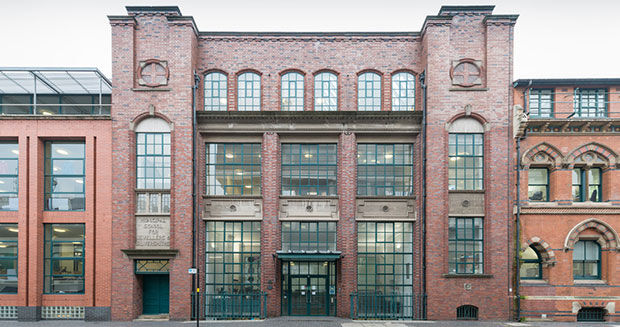
Our Facilities
The School of Jewellery at Vittoria Street is inspirational and functional. A blend of traditional historic and cutting-edge contemporary, it is light, spacious and extremely well-resourced.
An extensive refurbishment programme integrated the Victorian Gothic building of 1863 with the adjacent 1912 extension and a site further down the road. The architects’ success in doing so resulted in awards from the Royal Institute of British Architects (RIBA) and the Civic Trust.
Horology students also have dedicated areas, as well as the latest CAD equipment. The School’s main computer suite includes CAD design software and Adobe Creative Suite, and you’ll have access to a specialist library.
Our Centre for Design and Digital Manufacturing (CDDM) situated within the heart of the School of Jewellery offers expertise in computer-aided design and manufacturing, rapid prototyping, and has a state-of-the-art precious metal laser sintering facility.
Our staff
Nuala Clooney
Course Director, Lecturer
Nuala Clooney is an artist working with sculpture and video based in Birmingham, UK, and teaches on jewellery Foundation courses. Nuala has exhibited internationally and extensively across the UK.
More about NualaBridie Lander
Academic Lead for Jewellery, Senior Lecturer
Bridie is an experienced jewellery designer/maker and lecturer. She spent several years as an artist and academic in Australia where latterly she was Coordinator of the Jewellery and Object Studio at Sydney College of the Arts, University of Sydney. Some of her work was recently included in a group exhibition, “Transplantation: British and...
More about BridieJeremy Hobbins
Deputy Head of the College of Jewellery, Fashion and Textiles
Jeremy worked as a professional horologist for others, and himself, for 20 years before returning to BCU to share his love of the subject and train a new generation of horologists.
More about Jeremy


















